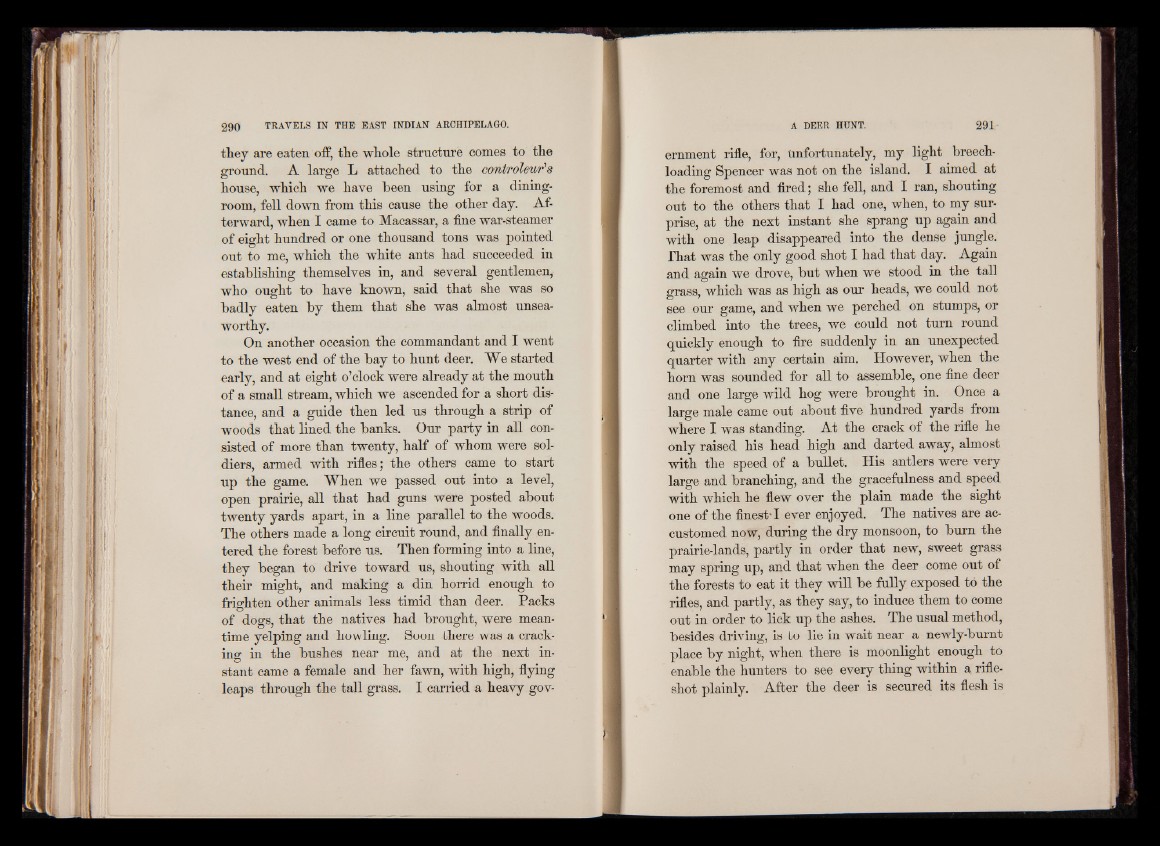
they are eaten off, the whole structure comes to the
ground. A large L attached to the cont/rolev/r's
house, which we have been using for a diningroom,
fell down from this cause the other day. Afterward,
when I came to Macassar, a fine war-steamer
of eight hundred or one thousand tons was pointed
out to me, which the white ants had succeeded in
establishing themselves in, and several gentlemen,
who ought to have known, said that she was so
badly eaten by them that she was almost unseaworthy.
On another occasion the commandant and I went
to the west end of the bay to hunt deer. We started
early, and at eight o’clock were already at the mouth
of a small stream, which we ascended for a short distance,
and a guide then led us through a strip of
woods that lined the banks. Our party in all consisted
of more than twenty, half of whom were soldiers,
armed with rifles; the others came to start
up the game. When we passed out into a level,
open prairie, all that had guns were posted about
twenty yards apart, in a line parallel to the woods.
The others made a long circuit round, and finally entered
the forest before us. Then forming into a line,
they began to drive toward us, shouting with all
their might, and making a din horrid enough to
frighten other animals less timid than deer. Packs
of dogs, that the natives had brought, were meantime
yelping and howling. Soon there was a cracking
in the bushes near me, and at the next instant
came a female and her fawn, with high, flying
leaps through the tall grass. I carried a heavy government
rifle, for, unfortunately, my light breech-
loading Spencer was not on the island. I aimed at
the foremost and fired; she fell, and I ran, shouting
out to the others that I had one, when, to my surprise,
at the next instant she sprang up again and
with one leap disappeared into the dense jungle.
That was the only good shot I had that day. Again
and again we drove, but when we stood in the tall
grass, which was as high as our heads, we could not
see our game, and when we perched on stumps, or
climbed into the trees, we could not turn round
quickly enough to fire suddenly in an unexpected
quarter with any certain aim. However, when the
horn was sounded for all to assemble, one fine deer
and one large wild hog were brought in. Once a
large male came out about five hundred yards from
where I was standing. At the crack of the rifle he
only raised his head high and darted away, almost
with the speed of a bullet. His antlers were very
large and branching, and the gracefulness and speed
with which he flew over the plain made the sight
one of the finest* I ever enjoyed. The natives are accustomed
now, during the dry monsoon, to burn the
prairie-lands, partly in order that new, sweet grass
may spring up, and that when the deer come out of
the forests to eat it they will be fully exposed to the
rifles, and partly, as they say, to induce them to come
out in order to lick up the ashes. The usual method,
besides driving, is to lie in wait near a newly-burnt
place by night, when there is moonlight enough to
enable the hunters to see every thing within a rifleshot
plainly. After the deer is secured its flesh is